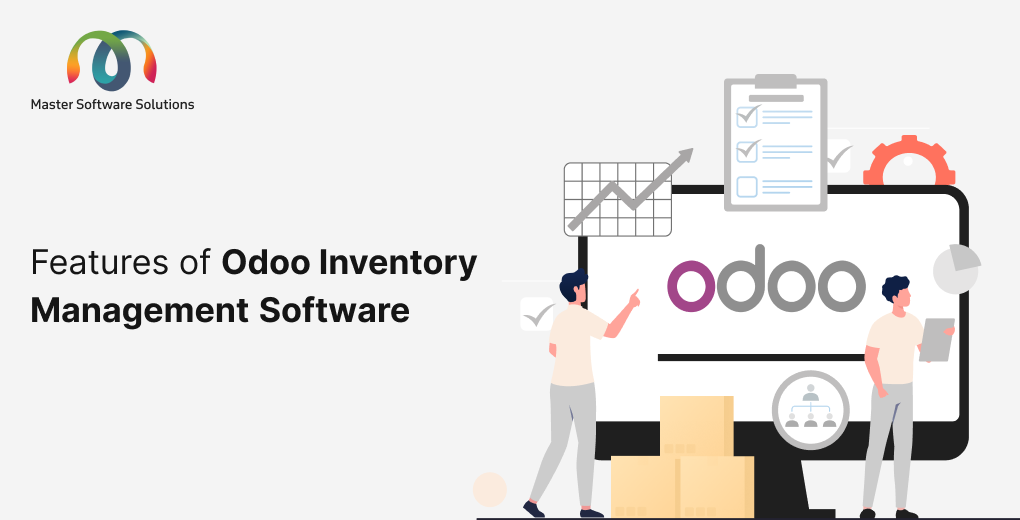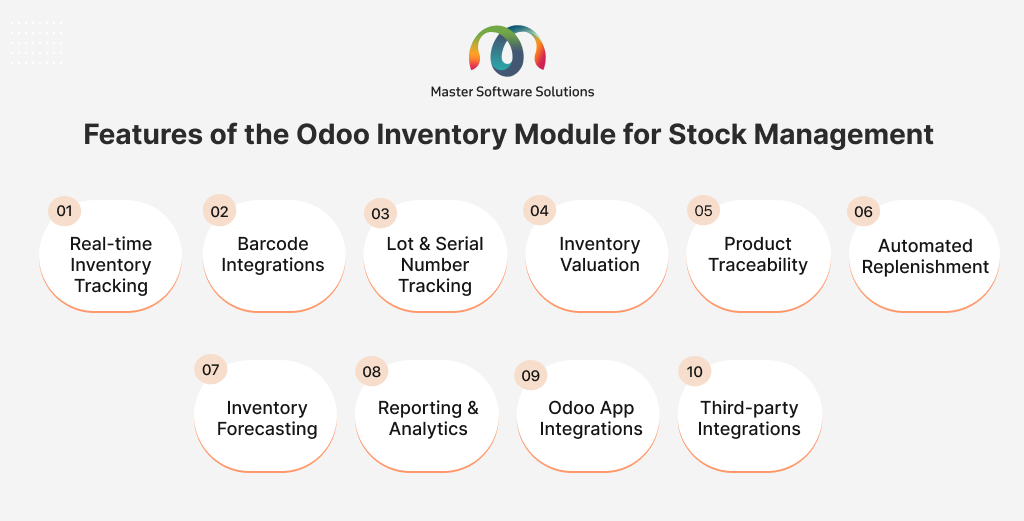Odoo is an enterprise resource planning system that helps businesses monitor operations and enables them to identify and resolve issues in real-time. This ERP suite is a collection of business applications that cater to different operations, including inventory management, manufacturing, finance and accounting, quality control, and reporting.
This blog explores the inventory management business application, a module, and examines how it helps businesses ensure seamless inventory management.
Fundamentals of Odoo inventory management
Odoo inventory is an integral part of Odoo ERP, providing real-time inventory visibility and ensuring sufficient stock to fulfill customer demands. Odoo is a centralized system that stores all the data in one place, enabling real-time data synchronization to provide real-time data.
The system supports deep integration with IoTs for improved tracking and more efficient operations and uses cutting-edge artificial intelligence for precise demand forecasting. The Odoo inventory module enables you to manage the warehouse and inventory.
Features of the Odoo inventory management module for managing the stock
You can monitor your inventory levels with the help of Odoo ERP’s advanced features. The system ensures optimal stock levels to fulfill customer demands, preventing stockouts and overstocking. The features of the inventory module for stock management are:
Real-time inventory tracking
This feature provides a real-time view of your stock levels across all locations. It promptly updates every inventory transaction, including sales, purchases, transfers, and adjustments in the system.
The system provides accurate stock visibility, informing you what you have on hand at any moment, preventing stockouts and overstocks. Based on current visibility, real-time inventory tracking improves decision-making about sales, purchasing, and production.
Automated inventory management reduces the chances of manual errors, minimizing discrepancies between physical stock and system records. The system automatically shares up-to-date and accurate information about product availability and delivery times with customers.
Barcode integrations
Odoo ERP supports seamless integrations with barcode scanners and label printers. You can assign barcodes to the products and locations for quick and accurate data capture while receiving, picking, packing, and stocktaking.
Integrating barcode scanners can significantly accelerate warehouse processes, improving process efficiency. It eliminates the need for manual data inputs, improving accuracy.
Barcode scanning ensures product traceability, enabling quick identification and tracking throughout the warehouse. It accelerates the physical stock counting and process accuracy.
Lot and serial number tracking
This Odoo feature enables you to track specific batches or individual units (serial numbers) of products. Lot or serial number tracking is crucial for products with expiration dates, warranty information, or those needing strict traceability, such as pharmaceuticals or electronics.
This type of tracking enables you to track the history and movement of specific product batches or units, enhancing traceability. This ensures quick identification and recall of affected products. It tracks the sale date and the warranty period for serialized items. Lot and serial number tracking ensure effective implementation of FIFO/FEFO strategies for perishable goods.
Inventory valuation
Odoo supports various inventory costing methods, including average cost, first-in, first-out, and standard price. It calculates the value of your inventory based on chosen methods and integrates this data with your accounting module.
It provides accurate inventory valuation for balance sheets and income statements. The system can automatically calculate the cost of goods sold (COGS) when the products are sold. You can analyze profitability to provide a clear understanding of product profitability. Inventory valuation ensures adherence to accounting standards for valuation.
Product traceability
Odoo allows you to trace the entire product lifecycle, from purchasing it from the supplier to its sale to a customer. You can track the origin, storage locations, and any transformations the product undergoes.
This offers end-to-end supply chain visibility, providing meaningful insights into stock movements throughout your supply chain. It enables you to trace the product back to the source, identifying the source of defects or issues.
Tracing the products is one of the major regulatory compliance requirements for some industries. This enhances accountability for product handling at each stage.
Automated replenishment
You can define rules to trigger purchase or manufacturing orders when the stock level hits thresholds, such as minimum stock rules, or based on anticipated demand, such as make-to-order.
Automating reordering ensures you always have enough stock to meet your customer demands. It also minimizes the chances of overstocking and prevents you from tying up capital in excess.
This automation optimizes procurement based on actual needs, freeing your staff and triggering purchase orders.
Inventory forecasting
Odoo can forecast future inventory levels based on the historical data, purchase orders, manufacturing schedules, and anticipated demand. This helps you anticipate potential stockouts and overstocking.
The system enables you to proactively manage inventory and make purchasing and production decisions in advance. This optimizes stock levels and maintains a balance between supply and demand.
Anticipating future inventory requirements accurately can help you minimize the holding cost of excess inventory. This also enhances planning and facilitates better production and sales planning.
Reporting and analytics
Odoo offers customizable reports and dashboards related to your inventory. You can examine stock levels, inventory valuation, turnover, production movement, and other factors.
They provide actionable insights into your inventory performance for data-driven decisions. Odoo’s advanced analytical capabilities can analyse data to identify trends and patterns, allowing you to understand product demand and seasonality.
You can track key performance indicators (KPIs), like stock turnover and fill rates. It enables you to identify the areas for optimization in your inventory management processes.
Odoo app integrations
The Odoo inventory module supports seamless integration with other Odoo applications, such as Sales, Purchase, Manufacturing, Accounting, and e-commerce. This creates an integrated business management system that allows smooth inventory data flow across multiple departments.
These integrations eliminate manual data entry between departments, mitigating data silos. This fosters collaboration, facilitating smooth communication and coordination across teams. Integrating multiple modules with the inventory module provides an end-to-end, holistic view of your business operations. Such integrations automate workflows across multiple departments.
Third-party integrations
Odoo has a flexible architecture that supports third-party integrations with third-party systems, including e-commerce platforms, shipping carriers, and other specialized logistics or warehouse management tools.
You can connect Odoo with specialized tools to meet specific business needs and enhance Odoo’s existing functionalities. Third-party integrations automate and streamline data flow between different systems. It can simplify and improve operational efficiency involving external partners or platforms.
Features of the Odoo inventory management module for managing the warehouse
Odoo’s inventory management module enables you to manage all warehouse operations from receiving, sorting, placing on shelves, and picking and dispatching them. These features collectively provide businesses with tools to organize their storage spaces, optimize material flow, and track inventory movement within their warehouse. The features of the inventory module of Odoo for warehouse management are:
Multiple warehouse management
Odoo enables businesses to manage multiple warehouses from a single system. This functionality is crucial if you have geographically dispersed operations or distinct storage needs for your various product types.
Warehouse layouts
You can specify storage locations, such as shelves, aisles, and operational areas like receiving and packing.
Putaway rules
Direct incoming stock items to optimal storage locations automatically based on the capacity, product needs, and accessibility.
Removal strategies
Implement stock removal strategies, including FIFO, FEFO, LIFO, or the nearest location, to optimize picking routes and minimize waste.
Picking operations
Odoo ERP inventory module supports various picking methods, including single, batch, cluster, and wave picking for efficient operations.
Packing and shipping
You can assign barcodes to packages for product tracking and update the location of the contained product. You can integrate shipping carriers to print labels and manage deliveries.
Returns
You can define the return products route, including assessment, refurbishment, restocking, and disposal. The system automates accounting updates.
Scrap management
Scrap returned or damaged products and generate reports on costs, reasons, and volumes.
Inventory adjustment
Schedule and perform stock counts on specific locations or products to maintain accurate inventory levels.
Cross-docking
The system directly transfers incoming material to outbound gates, minimizing storage space and costs.
Drop-shipping
Coordinate with your suppliers to ship products directly to your customers.
Push and pull rules
You can create custom rules to automate stock transfers between warehouses and locations.
Subcontracting
The Odoo system automates inventory delivery to subcontractors and manages the received finished goods.
Conclusion
These Odoo features within the inventory module provide a powerful tool for businesses to maintain accurate inventory records, optimize stock levels, track product movement within or across multiple warehouses, and make data-driven decisions, improving overall supply chain and operational efficiency.
Master Software Solutions is an Odoo development company that provides a one-stop solution for all your Odoo ERP implementation needs. We offer Odoo ERP consulting services that include implementation, migration, customization, module development, and integrations. We are partnered with Odoo Official and have already developed custom Odoo plugins. If you are interested in Odoo implementation, book a call to discuss your requirements.

